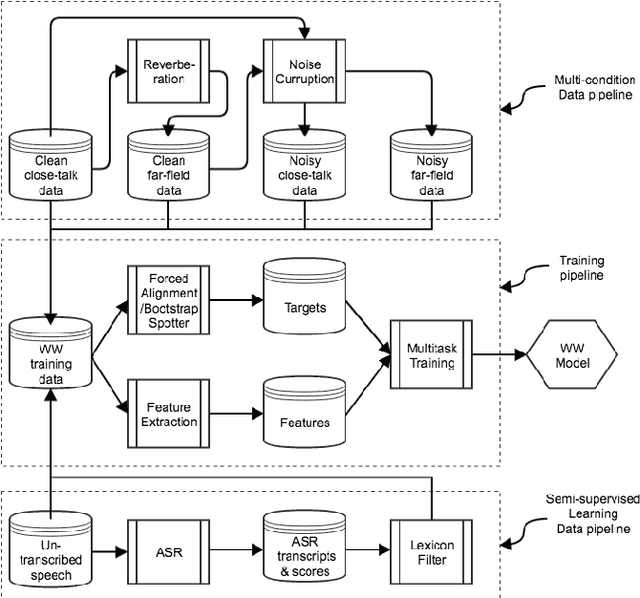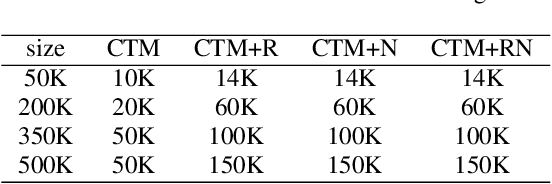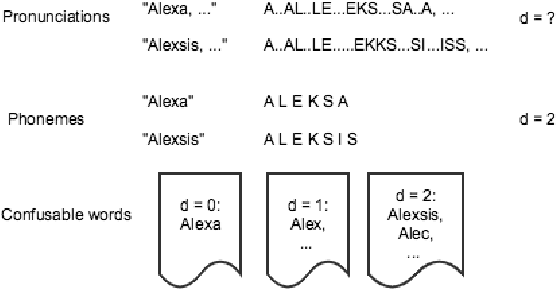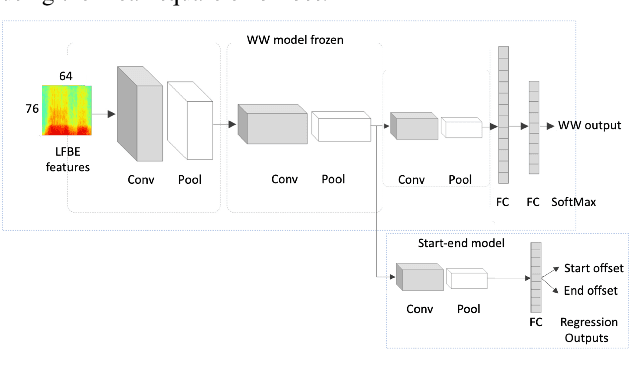Anish Shah
Towards Data-efficient Modeling for Wake Word Spotting
Oct 13, 2020



Abstract:Wake word (WW) spotting is challenging in far-field not only because of the interference in signal transmission but also the complexity in acoustic environments. Traditional WW model training requires large amount of in-domain WW-specific data with substantial human annotations therefore it is hard to build WW models without such data. In this paper we present data-efficient solutions to address the challenges in WW modeling, such as domain-mismatch, noisy conditions, limited annotation, etc. Our proposed system is composed of a multi-condition training pipeline with a stratified data augmentation, which improves the model robustness to a variety of predefined acoustic conditions, together with a semi-supervised learning pipeline to accurately extract the WW and confusable examples from untranscribed speech corpus. Starting from only 10 hours of domain-mismatched WW audio, we are able to enlarge and enrich the training dataset by 20-100 times to capture the acoustic complexity. Our experiments on real user data show that the proposed solutions can achieve comparable performance of a production-grade model by saving 97\% of the amount of WW-specific data collection and 86\% of the bandwidth for annotation.
Accurate Detection of Wake Word Start and End Using a CNN
Aug 09, 2020



Abstract:Small footprint embedded devices require keyword spotters (KWS) with small model size and detection latency for enabling voice assistants. Such a keyword is often referred to as \textit{wake word} as it is used to wake up voice assistant enabled devices. Together with wake word detection, accurate estimation of wake word endpoints (start and end) is an important task of KWS. In this paper, we propose two new methods for detecting the endpoints of wake words in neural KWS that use single-stage word-level neural networks. Our results show that the new techniques give superior accuracy for detecting wake words' endpoints of up to 50 msec standard error versus human annotations, on par with the conventional Acoustic Model plus HMM forced alignment. To our knowledge, this is the first study of wake word endpoints detection methods for single-stage neural KWS.
Deep Residual Networks with Exponential Linear Unit
Oct 05, 2016



Abstract:Very deep convolutional neural networks introduced new problems like vanishing gradient and degradation. The recent successful contributions towards solving these problems are Residual and Highway Networks. These networks introduce skip connections that allow the information (from the input or those learned in earlier layers) to flow more into the deeper layers. These very deep models have lead to a considerable decrease in test errors, on benchmarks like ImageNet and COCO. In this paper, we propose the use of exponential linear unit instead of the combination of ReLU and Batch Normalization in Residual Networks. We show that this not only speeds up learning in Residual Networks but also improves the accuracy as the depth increases. It improves the test error on almost all data sets, like CIFAR-10 and CIFAR-100
 Add to Chrome
Add to Chrome Add to Firefox
Add to Firefox Add to Edge
Add to Edge